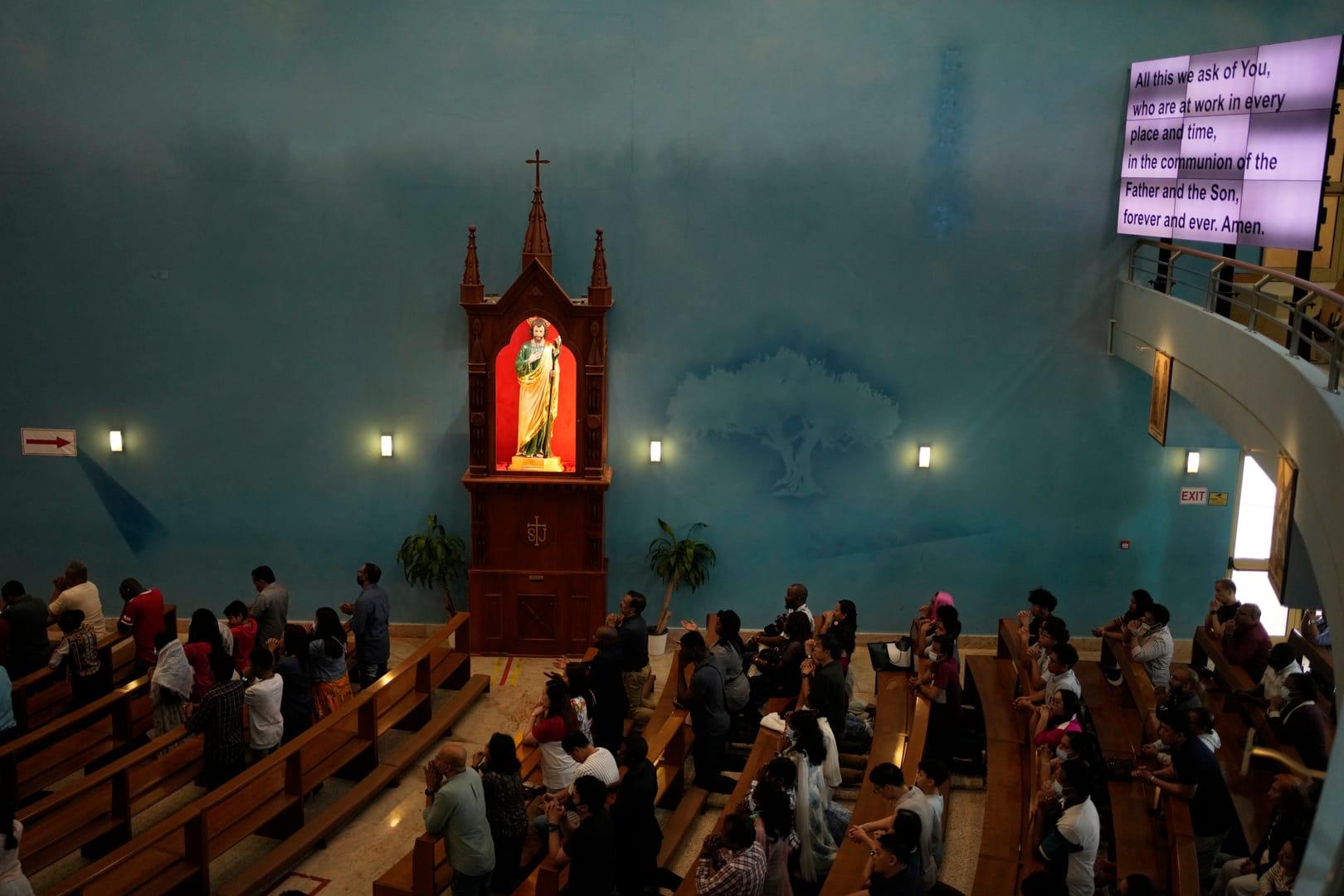DOHA, Qatar — Hymns echo through the spacious, blue-walled church. The congregants listen to the Gospel and the homily. They kneel, eyes closed and hands clasped in prayer or palms turned skyward. They line up to receive Communion as a choir belts out: “Lord, for my sake, teach me to take one day at a time.”
In many ways, the service at the Catholic Church of Our Lady of the Rosary feels like a standard Sunday Mass. But at this church in Qatar, the small Gulf emirate hosting the World Cup, there are some tweaks.
The church sits in a “religious complex” housing other Christian denominations. Its building looks non-descript from the outside, with no crosses on its exterior. Sunday Mass is celebrated also on Fridays and Saturdays, the weekend days in the conservative Muslim country.
“This is something very unique here in the Middle East,” said parish priest, Father Rally Gonzaga. “Our Sunday is Friday.”
From Masses to baptisms, weddings and confessions, the church provides a window into the religious life of Catholic expatriates in Qatar. Mass is offered in multiple languages, including English, Arabic, Konkani, Tagalog and Sinhala, to cater to Catholics from India, the Philippines, Sri Lanka and other countries. While Qatar is unusually full of visitors now for the World Cup, migrant workers already make up the majority of the country’s population of about 3 million.
“When I was in the Philippines, I only catered to the Filipinos. But here, (there are) different nationalities and then they have different cultures,” Gonzaga said. “I could feel the real spirit of the church, the universal church,” he said, adding the different communities learn from each other.
Non-Muslim religious groups in Qatar include Hindus, Roman Catholics and Buddhists, with smaller groups of Anglicans, Protestants, Egyptian Copts and others, according to a U.S. Department of State’s report on international religious freedom for 2021.
Sunni and Shiite Muslims and eight Christian denominations constitute the registered religious groups; unregistered religious groups are illegal, but Qatari authorities generally permit them to practice their faith privately, the report added.
The complex known as “Church City,” located on government-owned land, provides worship space for Christian denominations, “with clear government instructions that Christian symbols such as crosses, steeples, and statues were not permitted on the exterior of church buildings,” the report said. Gonzaga said having no crosses outside was out of “respect” for the country and its people.
Like other Gulf nations, Qatar has faced criticism, particularly in the run-up to the World Cup, for its use of low-paid migrant workers to build and support skyscrapers, roads and other projects amid concerns for their rights. Qatari authorities say they have taken steps to improve labor conditions. Rights groups, while crediting Qatar with reforms, have called for more to be done.
The needs of migrant workers who have left behind wives and children to work for long stretches in Qatar and other Gulf countries condition much of the pastoral care that the Catholic Church provides in that region.
During a visit to Bahrain last month, Pope Francis lamented that much labor can be “dehumanizing” and encouraged the promotion of equal rights for workers. Worshippers from Saudi Arabia, Kuwait and other Gulf countries packed the Bahrain national stadium for Francis’ big Mass.
The pope delivered a similar message in 2019 in Abu Dhabi where he also called for greater access to citizenship for residents of different beliefs.
Gonzaga described a religious life within the church complex in Qatar that includes Masses, celebrations for Christmas and catechism classes where children are taught the basics of the faith from prayers to the sign of the cross.
“Many people think that there is no Christian church here,” Gonzaga said at his office, surrounded by statues of the Virgin Mary, a crucifix and illustrations of the sacraments. “That’s why they are surprised when they see … that we could do everything that we are doing inside the compound of the church.”
A newly erected Christmas tree just outside the church building towers over churchgoers waiting to take photos with it.
Another priest, Father Albert, said there are some differences in marking Christmas here from what he was used to in India.
“There, we can go for carol singing on the streets and we can go door-to-door and we can express our joy,” he said. “But, here, it’s not possible. … We respect the feeling of other religion(s).”
Carol singing and other festivities take place within the complex, he added.
Qatari law restricts public worship for non-Islamic faiths and criminalizes proselytizing on behalf of an organization, society, or foundation of any religion other than Islam, the State Department’s report said.
Outside the complex, priests visit Christian inmates and go into hospitals to respond to requests for Communion, confessions or anointing of the sick.
“I go there wearing this,” Gonzaga said, pointing to his Franciscan habit, adding he feels accepted and respected. “I don’t encounter any problem,” he said.
Some Catholics living far from the complex would like to see a new church in a different part of the country, Gonzaga said. That might have helped Catholics like Christopher Battad. He used to work in an area that is far from the complex and couldn’t regularly make the trip to church, which made him feel guilty.
“I just feel that something is less in my heart,” he said.
Still, he would pray, use a rosary and sometimes watch online services streamed from the Philippines, where he’s from. Now, he lives closer to the church.
Riya Sebastian, who moved to Qatar from India, said she’s been finding solace and joy at the church.
“It gives more peace and happiness in my life,” she said. “Christmas is coming and when this is going on, we should … beautify our hearts to receive our Jesus Christ.”
Associated Press journalists Maria Grazia Murru and Thanassis Stavrakis in Doha and Nicole Winfield in Rome contributed to this report.












